What Joe Biden said in his first presidential press conference
The US president takes questions from reporters on a wide variety of issues, including migration, China, COVID vaccines and voting rights.
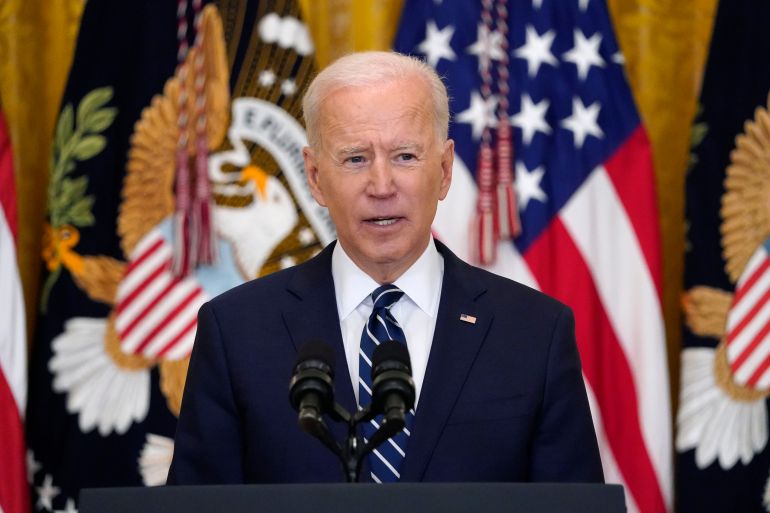
- US President Joe Biden holds the first formal news conference of his presidency at the White House.
- Biden faced criticism for not holding a news conference during the first 50 days of his term, though he has spoken to reporters multiple times since he took office on January 20.
- Reporters raised questions about pressing issues such as the migrant surge at the US-Mexico border, gun control, relations with China and Russia, and withdrawing troops from Afghanistan.
Welcome to Al Jazeera’s coverage of President Joe Biden’s first formal news conference. This is William Roberts, Steve Chaggaris and Creede Newton.
Keep reading
list of 3 itemsBiden names Harris to lead effort to stem migration at border
Biden may keep Trump policy that upped drone exports: Report
‘Very good performance’: Al Jazeera correspondent
Amid “murmuring here in the United States” about the 78-year-old Biden’s delay in holding his first formal news conference with some suggesting “he wasn’t capable, he might not be able to hold a thought, there were questions about his health”, Al Jazeera White House correspondent Kimberly Halkett gave his performance a positive review.
“He showed the world that he was very adept about various ranges of policy in a detailed way,” Halkett said. “I think that there was overall a very good performance by this president as he handled a number of different complex policy issues.”
Biden says next major initiative will be infrastructure, jobs
President Joe Biden said his next major political initiative to promote infrastructure development in the US will be unveiled when he visits Pittsburgh next week.
“I’ll be announcing the fight in Pittsburgh in detail is to rebuild the infrastructure both physical and technological infrastructure in this country so that we can compete and create significant numbers of really good paying jobs,” Biden said.
US will compete with China and President Xi Jinping
The president said he has a good relationship with his Chinese counterpart XI Jinping, with whom Biden had a two-hour initial telephone conversation that surprised China watchers.
“He is one of the guys like [Vladimir] Putin who thinks that autocracy is the wave of the future, democracy can’t function in an ever more complex world,” Biden said.
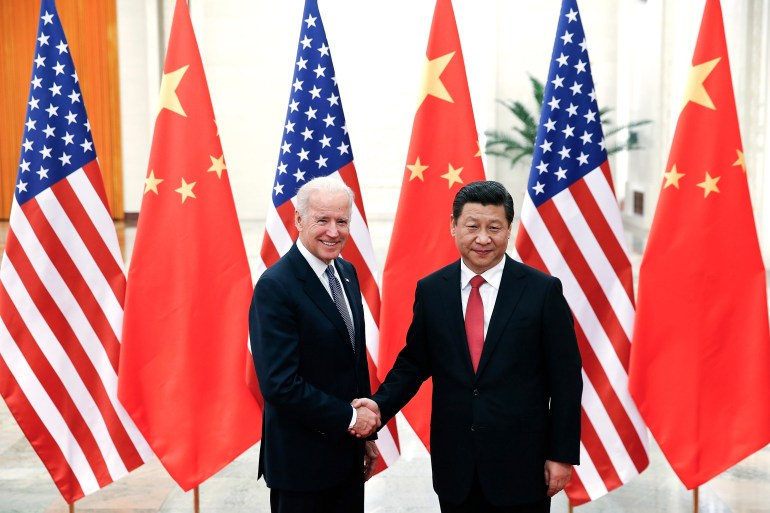
Biden said he made it clear to Xi that the US will invest in its economy and democracy at home, compete with China in investment in future technologies and advocate for human rights.
“This is a battle between the utility of democracies in the 21st Century and autocracies,” Biden said. “We have got to prove that democracy works.”
Biden’s ‘expectation’ is to run for re-election in 2024
Amid speculation that the 78-year-old Biden will only serve one term as president, he was asked what his plans were for the next presidential election in 2024.
“My plan is to run for re-election. That’s my expectation,” Biden said.
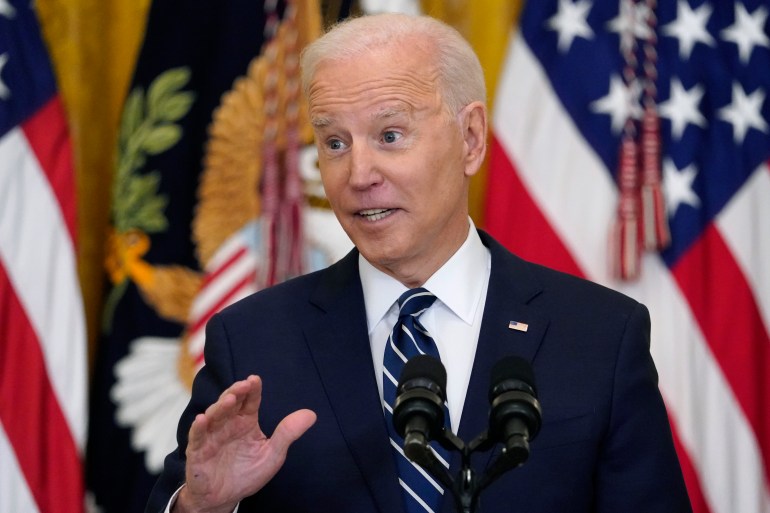
When pressed on it, he added a caveat: “I’m a great respecter of fate. I’ve never been able to plan four and a half – three and a half years in advance for certain.”
Biden added that he “would fully expect” Kamala Harris to be his running mate if he does run again. “She’s doing a great job. She’s a great partner.”
As for whether he is anticipating a rematch with Donald Trump, Biden chuckled and said, “I don’t even think about it. I have no idea. I have no idea whether there will be a Republican Party.”
Biden denounces Republican drives to limit voting in US states
President Joe Biden said efforts by Republicans in state legislatures to restrict voting following Donald Trump’s defeat in the 2020 election is “sick”.
Biden claimed the “Republican voters I know find this despicable”.
“I’m convinced that we’ll be able to stop this because it is the most pernicious thing,” reminiscent of Jim Crow laws that disenfranchised Black voters in the south after the Civil War, he continued.
Biden: North Korea is top foreign policy issue
When asked if he agreed with his predecessor, Donald Trump, who said North Korea was the top foreign policy issue that he was watching during his presidency, Biden said, “Yes.”
#BREAKING North Korea fires 'unidentified projectile' into sea: South's military pic.twitter.com/ORCb7PfC3l
— AFP News Agency (@AFP) March 24, 2021
He said in the wake of North Korea’s launch of two ballistic missiles into the Sea of Japan on Thursday, the US is “consulting with our allies and our partners and there will be responses if they choose to escalate. We will respond accordingly.”
“I’m also prepared for some of diplomacy, but it has to be conditioned upon the end result of denuclearisation,” Biden added.
Biden supports US Senate rules change to break political logjam
President Biden said he supports a change in procedures in the United States Senate that would allow Democrats to overcome Republican opposition to main legislative proposals.
The so-called “filibuster” which requires a 60-vote margin to bring debate to an end has been “abused in a gigantic way”, Biden said.
Biden said he “strongly” supports moving to a new Senate procedure that would allow Republicans who oppose legislation to debate as long as they want but then clear the way for votes.
“We are ready to get a lot done. And if we have to, if there is complete lockdown and chaos as a result of the filibuster, then we will have to go beyond what I am talking about,” Biden said.
The US Senate is presently divided 50-50 between Democrats and Republicans with Vice President Kamala Harris as the tiebreaker. That gives Democrats a narrow 51 vote majority which allows them to control the Senate agenda but not meet the 60-vote threshold.
Biden says ‘can’t picture’ US troops in Afghanistan in 2023
Asked if US troops would leave Afghanistan under the deal made by predecessor Trump, Biden said, “It’s going to be hard to meet the May 1 deadline … to get troops out.”
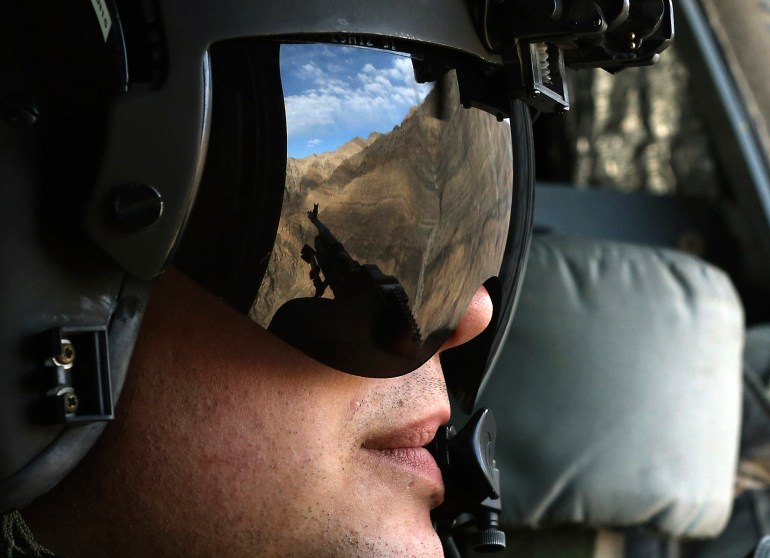
Secretary of State Antony Blinken has been meeting NATO allies which also have forces in Afghanistan, on “how to proceed”, he said.
“If we leave we’re going to do so in a safe and orderly way … It is not my intention to stay there for a long time,” he said.
When asked if US troops could be in Afghanistan next year, he said: “I can’t picture that being the case.”
Biden: Migration spike happens ‘every single solitary year’
President Biden insisted the surge in migrants at the US-Mexico border is not unique to his presidency and that his administration is scrambling to deal with it because former President Trump’s border policies “dismantled” the system to deal with border crossers.
“Truth of the matter is, nothing has changed,” Biden said. “It happens every single solitary year. There is a significant increase of people coming to the border in the winter months.”
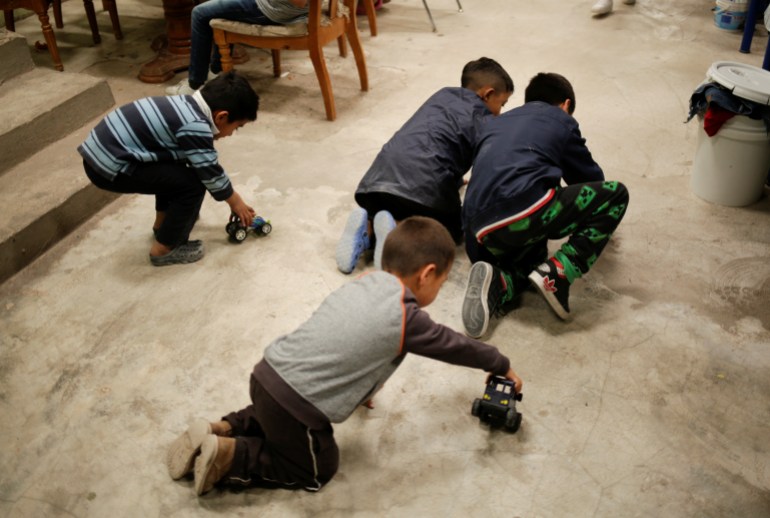
Immigration experts back up that claim, but it is also true that there is a significant spike, especially of unaccompanied minors, that has created a massive backlog in processing and housing them, something the Biden administration is struggling with.
Biden blames Trump for that aspect, saying, “What we’re doing now is attempting to rebuild, rebuild the system.”
“We’re building back up the capacity … that Trump dismantled. It’s going to take time.”
Biden says COVID-19 is top problem facing US
President Biden, asked how far he is willing to push Congress to address politically difficult issues of immigration, gun control and climate change, said his number one focus is ending the coronavirus pandemic.
“I got elected to solve problems and the most urgent problem facing the American people – I stated from the outset – was COVID-19 and the economic dislocation for millions and millions of Americans,” Biden said.
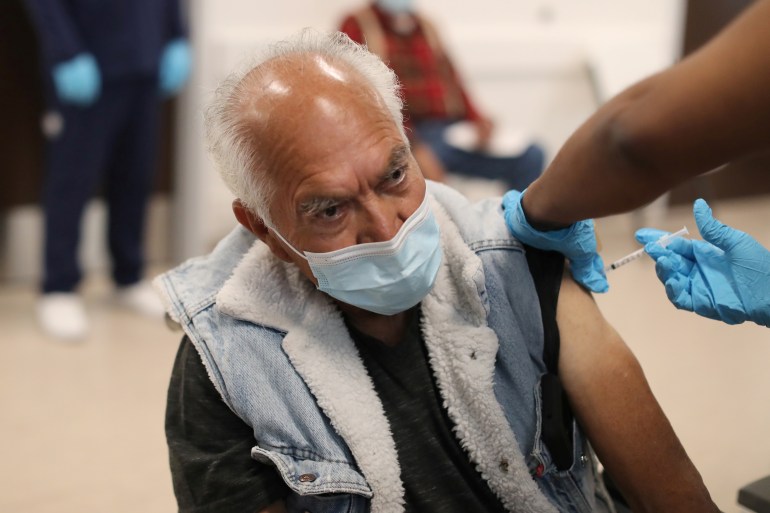
“The other problems … immigration to guns and the other things you mentioned are long-term problems, they have been around for a long time,” Biden continued.
“Our Republican colleagues are going to have to determine whether or not we want to work together,” he said.
Biden ups vaccination goal
During his opening remarks of his news conference, President Joe Biden announced he is doubling his vaccination goal for the start of his presidency.
“We will by my 100th day in office have administered 200 million shots,” he said.
LIVE: Joe Biden holds his first formal news conference as US president, more than two months after taking office.
Read More: https://t.co/UkQQLbgGft https://t.co/2P2wUatVZS— Al Jazeera News (@AJENews) March 25, 2021
Biden’s original goal, set in December before vaccine distribution began, of 100 million vaccinations in 100 days was met last week on Day 58 of his presidency. Critics suggested his goal was a low bar and would be easily met.
His new goal will unlikely quiet his critics on Day 64 of his presidency.
The US is already less than 70 million shots away from his new goal of 200 million and the US is currently averaging about 2.5 million vaccinations a day. If that pace keeps up, Biden’s goal will easily be met before Day 100.
Biden preparing executive orders on gun control: Report
In the wake of mass shootings in Georgia and Colorado, President Biden is considering several executive orders to quickly address gun control while legislative action in the US Congress is stalled.
There are three executive actions White House lawyers are reviewing for the president, according to a report in The New York Times.
One would classify as firearms kits that allow guns to be assembled from unregistered parts, so-called ghost guns. A second would fund community violence intervention programs.
A third executive measure would strengthen the patchwork US system of background checks of gun buyers, the newspaper reported, citing unnamed congressional aides who have been consulted by White House officials
A ‘sombre’ Biden to focus on gun control, COVID-19 relief: Analyst
President Joe Biden will use his first presidential news conference to send several political messages to the American public, starting with reaction to the recent shootings in Colorado and Georgia but also focusing on recovering from the coronavirus pandemic, an analyst said.
“He will start by doing what he does so well and showing compassion and concern for those who are affected by the shooting,” said James Thurber, a professor of politics at American University.
Biden will strike a “sombre” tone and express the “need for gun control” before turning the discussion to the more politically advantageous topic of what his administration is doing to end the pandemic, Thurber said.
Pandemic-era press conference
Traditionally, presidential news conferences in the East Room of the White House are a crowded affair, with dozens of reporters sitting shoulder-to-shoulder. With COVID precautions in place, today’s event will look quite different.
Getting ready. pic.twitter.com/C4S4xybkz4
— Meghan Hays (@MegHays46) March 25, 2021
Only 30 socially distanced chairs have been set out, The Associated Press news agency reports, as attendance will be limited.
And White House aides will sanitise the microphones used by each reporter before being passed to the next questioner.
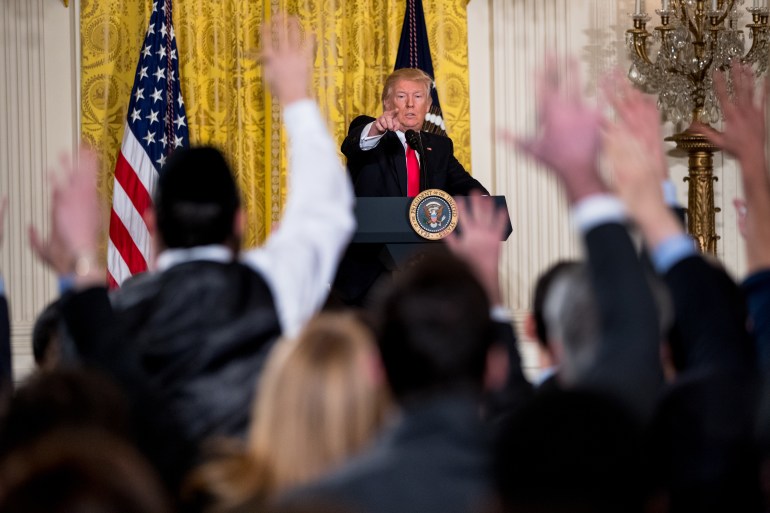
What will Biden be asked about?
Reporters – and the president – spend hours preparing for these formal news conferences, and there are obvious lines of questioning that are bound to come up.
There are “news of the day” topics such as the coronavirus pandemic, the migrant surge at the US-Mexico border, and the recent mass shootings in Georgia and Colorado – as well as the racial justice and gun control angles that stem from those shootings.
There are also the broader policy topics that he could be questioned about including his upcoming announcement of an infrastructure plan, how he hopes to get that through Congress and whether taxes will be raised to pay for it. There are pressing foreign policy questions about China, North Korea, Russia, Yemen and Afghanistan, to name a few.
And more than likely there will be a few curveballs that the audience, and perhaps Biden as well, do not see coming, potentially adding some spontaneity to the event.
Biden’s late start
President Joe Biden’s first news conference coming on the 64th day of his presidency is late by recent standards. The president and his staff have been under pressure from media organisations in recent weeks to schedule the event, which carries risks for Biden as he has a tendency to stumble over his words and commit political gaffes.
Solo press conferences have unique value for the public. Biden should do more of them and deserves some criticism for this. However, people on the political media and White House beats have no excuse for not knowing this context or including it in pieces on this.
— Hunter Walker (@hunterw) March 14, 2021
Former President Trump held his first solo news conference on February 16, 2017 – 26 days after taking office – but it proved to be his only news conference in the first year of his presidency amid a combative relationship with the media. Trump preferred to take questions in the informal settings of short question-and-answer sessions with the pool of reporters who covered his travel events.
Biden and his White House team have promised greater transparency and a better relationship, but have maintained tight control of information.
Biden’s first formal news conference as president
Joe Biden is holding the first televised press conference of his presidency on Thursday. The 13:15 EDT (17:15 GMT) scheduled event will be held in the East Room of the White House, which is traditionally where presidents hold formal news conferences.
President Dwight Eisenhower held the first presidential news conference to be broadcast on television back in 1955. Media representatives who regularly cover the president and his travels will be called upon by name to ask their questions, for which the president’s staff will have tried to prepare answers.
This Day, 1955: Dwight Eisenhower held the first (taped) televised presidential news conference. "Well, I see we are trying a new experiment this morning," he told the assembled White House press corps. "I hope it doesn't prove to be a disturbing influence.” /1 pic.twitter.com/F3Mdq9Ku8B
— West Wing Reports (edited by Paul Brandus) (@WestWingReport) January 20, 2019